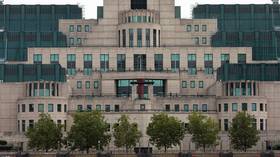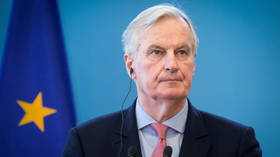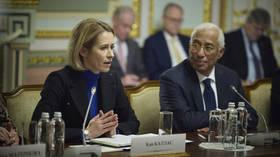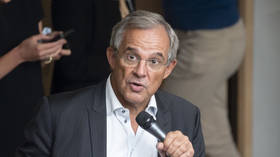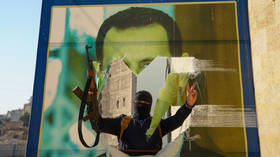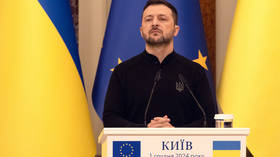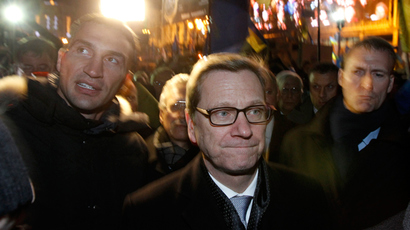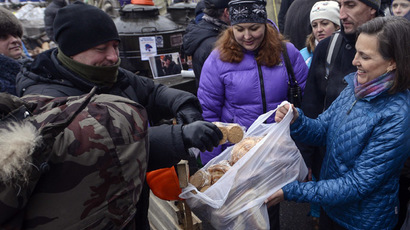Ukraine bans foreigners for ‘security reasons’ as protests continue
Ukraine has temporarily banned a number of foreign citizens from entering its territory over “national security” concerns. The move comes amid ongoing mass rallies, with thousands of pro-EU demonstrators demanding the government’s resignation.
The Security Service of Ukraine (SBU) said that in November-December 2013, in accordance with the law and “in the interests of ensuring Ukraine's national security,” it made the decision to “temporarily ban” a number of foreign nationals from entering the country.
The decision to close the country’s door to each of those persons was made individually, rather than under a so-called “blacklist,” the SBU said in a Wednesday statement, as quoted by Interfax Ukraine news agency.
The SBU has not specified who has been temporarily denied entry into Ukraine.
The statement follows reports in the media that 36 foreigners suspected of working with the opposition “to destabilize the situation in the country” were blacklisted in the former Soviet republic.

The idea had been put forward by Oleg Tsaryov, a lawmaker from the ruling Party of Regions, who had filed a request to Ukraine’s Foreign Ministry and the SBU.
“The more frequent visits by foreign political strategists and specialists in protests cause quite reasonable concerns,” Tsaryov said in the document, which was published on his Facebook page.
The document was submitted together with a list of people, who, “as part of the advisory work” with the opposition, pursue the political interests of other states.It included three Americans, a Brit, a German, a citizen of Serbia, 29 Georgians, and former Georgian President Mikhail Saakashvili. No current politicians were among the names proposed by the Ukrainian lawmaker.
Mass pro-EU rallies were marked by western politicians’ regular visits to Kiev and their emotional condemnations of Ukrainian authorities. Such pilgrimages were condemned by some analysts, as well as the ruling party’s MPs, as meddling in the country’s internal affairs.
German Foreign Minister Guido Westerwelle, who came to Ukraine for an Organization for Security and Co-operation in Europe (OSCE) summit, also visited the opposition’s protest camp in early December. Accompanied by two Ukrainian opposition leaders, he toured Kiev’s Independence Square and European Square - the two main venues for the demonstrations.
US Assistant Secretary of State Victoria Nuland was spotted on December 11 distributing cookies to protesters in central Kiev.
Later in December, Senator John McCain arrived in Kiev to show his support for the opposition. Addressing protesters in Kiev's main square, he stated that Ukraine's future was with Europe, adding that the country would “make Europe better.”

The report about banned foreigners has caused a stir in the media. Meanwhile, the Georgian Embassy in Kiev has asked the Ukrainian Foreign Ministry for an official explanation.
Saakashvili said he regrets that he will “probably” not be able to visit Ukraine in the coming weeks. “But my heart and soul will be with my Ukrainian sisters and brothers fighting for their independence, their freedom and their well-deserved European future,” he wrote on his Facebook page.
Saakashvili, the leader of the Georgian Rose Revolution, visited Ukraine on December 7 to show his support for protesters. He addressed demonstrators rallying on Kiev’s central Independence Square, Maidan, with a brief speech in Ukrainian.
The SBU denied on Wednesday the existence of the so-called blacklist, otherwise known as the “Tsaryov list.” However, Tbilisi’s Ambassador to Kiev told Kommersant Ukraine yesterday that three Georgian nationals had already been denied entrance to Ukraine.
Ukrainian opposition representatives said the ban could lead to “serious international consequences.” Valentyn Nalyvaichenko, an MP for the opposition Udar (Strike) party and former head of the SBU, told the paper that countries whose nationals were “blacklisted” would demand explanations. If reasons for the move were groundless, those nations would come up with an appropriate response. “If these countries – the US, the EU and Georgia – ban entry for [President Viktor Yanukovich, Prime Minister Nikolay Azarov] and their children, Yanukovich would probably be able to go only to North Korea,” he said.



